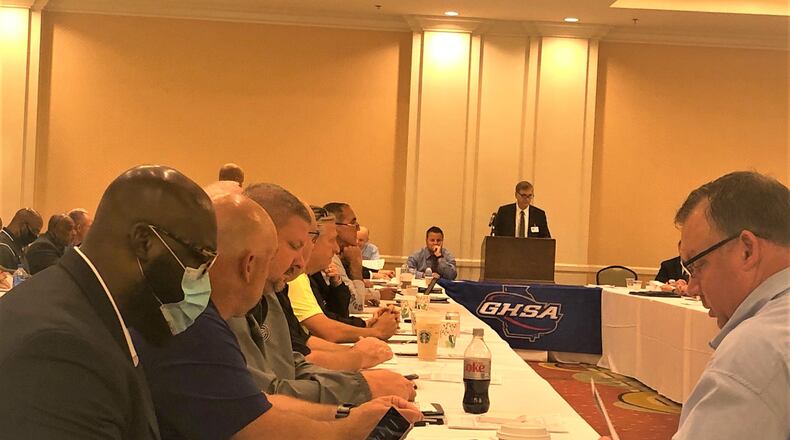Macon — The landscape in the Georgia High School Association will look much different when the new region alignments are announced later this year. Upward mobility among the city schools and private schools, based on the newly adopted multiplier, is guaranteed to shake things up.
The proposal from the reclassification committee to increase the multiplier from 2.0 to 3.0 was overwhelmingly approved by the GHSA’s executive committee at its annual fall meeting on Monday. In the final vote, 56 voted yes, 15 voted no and there were three abstentions.
“The key was to try to find something that would be evenly applied to all schools,” said Fulton County director of athletics Stephen Craft. “The multiplier counts the same for all schools and that will help us even out the playing field when it comes to the overall success of these athletic programs.”
The vote penalizes city schools and public schools from bringing in students from outside their designated attendance zone. Representatives argued that the ability to “recruit” students from other areas provides a competitive advantage for the city and private schools over the public schools, who are limited to the students inside their geographical boundaries. It might be compared to the financial penalties incurred by professional teams who surpass the salary cap.
Jasper Jewell, the director of athletics for the Atlanta Public Schools, was initially skeptical when the the multiplier was increased two years ago. Now he’s fully onboard with the change, even though it will have an impact on the two charter schools under his direction.
“The competitive balance just wasn’t even,” Jewell said. “The Georgia High School Association represents all schools. Even though it was founded on the premise of public school education, we love the private schools and the city schools. I, myself, am the athletic director of a public school system. But some schools just have the advantage that’s just not fair. We just wanted to have an opportunity to level the playing field.”
The main pushback was from the private schools, who face the prospect of moving up from three or four classifications. Larger private schools like Marist, St. Pius, Blessed Trinity and Benedictine could find themselves playing in Class 7A next year.
“We’re right on the borderline of being popped up, maybe to 7A” said Ricky Turner, Blessed Trinity’s director of athletics. “We want our kids to be able to participate within the size of school we are. You just have to wait and see where it goes and figure it out in the next few weeks.”
Chris Hanson, the athletics director at Trinity Christian School in Sharpsburg, was an outspoken critic of the change — even though his school won’t be affected.
“So moving down the line, say we go for another two years and all of a sudden the reclassification committee is going to go up to 4.0?” Hanson said.
Perhaps, said Mary Persons principal Jim Finch. “The fulcrum has not been found. It may (increase) and I’m not saying it can’t come back. I know we have found where it is yet. That’s my opinion,” Finch said.
Hanson said the new multiplier could create a safety issue since the schools being forced to move into higher classifications won’t have as many bodies available as the big public schools.
“You know, Mercer will play Alabama once a year,” Hanson said. “Now some of these schools are going to be preparing for Alabama every week. That’s where the disparity of the safety comes into play. Colleges can pick and choose a good opponent, but you know that next week you’re going to go back down to your playing field. It takes a toll on these kids.”
City schools like Buford, Valdosta, Cartersville, Calhoun and Jefferson are likely to feel a sting by the increased multiplier. Those schools are almost assured of moving up in classification, although the final destination is unknown.
Bremen, a small city school in west Georgia, is currently in Class 2A and could also face an elevation. Davis Russell, the school’s football coach, is also a member of the executive committee and acknowledged things could change.
“It’s going to affect us,” Russell said. “Bremen is a unique place. We have a very small district. Hey, live like a mile and a half from the school and the back of my neighborhood is out of the district. But I know the GHSA will do a good job of understanding that every city school and every situation is different and they’ll take into account when the appeals happen.”
Any school that doesn’t like its classification assignment has the right to appeal. Two years ago the GHSA approved 17 of the 24 appeals.
The new rule does not affect the Class A Private classification, where no multiplier is used. That proposal was approved 66-8.
“We addressed that situation and it seems to be working,” GHSA president Glenn White said. “We’re not going to bother that.”
About the Author
The Latest
Featured


